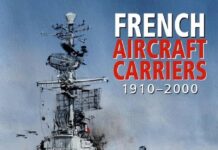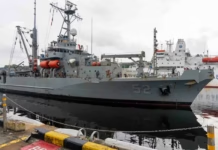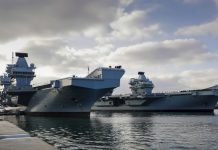
By Tom Sharpe*
At 11.45am, on Oct 21, 220 years ago, Vice-Admiral Horatio Nelson ordered the most famous military message ever sent to be hoisted as a flag signal on HMS Victory’s starboard mizzenmast yardarm: “England expects that every man will do his duty”. As the columns of warships closed towards each other at no more than a walking pace, the English sailors roared their approval in unison at the sentiment from their dear Admiral.
Except they didn’t, at least not all of them.
Vice-Admiral Cuthbert Collingwood, Nelson’s deputy fleet commander in HMS Royal Sovereign, was heard to mutter: “I wish Nelson would stop signalling; we know well enough what to do,” and initially refused to relay the message to the ship’s company.
Collingwood was a stoic even by the standards of the time – he refused to have a pretty severe bruise caused by a flying splinter registered in the ship’s medical log – so he might have just been being droll rather than disrespectful. Other responses were mixed, though. In the Euryalus, nobody bothered to repeat the words to the crew, and in the Ajax, the officer who was sent to read it out on the gun decks heard sailors muttering: “Do my duty? I’ve always done my duty; haven’t you, Jack?”
Presumably Nelson’s next signal, “prepare for action”, was similarly received by Collingwood, given that his aggressive manoeuvring at the head of the lee column put him one to two miles ahead of Nelson and therefore somewhat closer to the action as this signal went up.
Capt Henry Blackwood in HMS Euryalus noted in his journal, “The Admiral was unusually communicative today, sending signals with great frequency as we closed the enemy.”
What I’m saying here is that naval audiences have clearly always been a tough crowd when it comes to communications. Gen Sir Gwyn Jenkins of the Royal Marines, the Royal Navy’s new First Sea Lord, will probably agree.
On Trafalgar Day last week, he wrote on X: “Today on Trafalgar Day we honour Nelson’s legacy – leadership built on trust, clarity of intent and empowering teams to adapt and win. Today, the RN continues to prepare for warfighting readiness. To the Immortal Memory of Admiral Lord Nelson, and to all those who fell with him.”
This triggered something of a pile-on, the politest of which ran along the lines of “drop the LinkedIn corporate speak, General”.
“England expects…” might have received the same treatment in today’s unforgiving climate. How could Nelson possibly know what England expected? Was he aware that many of his sailors were not English anyway?
Of course, even “England expects…” had been messed about with. It was going to start off “Nelson confides”, until someone suggested “England confides”. This is softer, more nuanced and probably would enrage the X crowd less (if that were possible) but it was also harder to hoist quickly. In the then-current Popham signal book, “confides” had to be spelt out with eight letter flags but “expects” did not. Even the most famous flag hoist in history was subject to “staffing faff” before being sent.
One lesson from this story is seldom mentioned, but it’s worth noting that Lieut John Pascoe, in charge of signals in the Victory, felt able to make a suggestion to the big boss on this matter despite the immense pressure they both must have been under. Good leaders create the conditions for constructive challenge like this. Great leaders allow such things to happen even in times of extreme pressure and then adjust when appropriate. Bad leaders dismiss suggestions or, worse, don’t even permit them.
So why is it that the immortal memory of Lord Nelson is celebrated every year and he has his own column in the heart of London, whilst his arguably more well-rounded contemporary, Collingwood, only has the brownest, drabbest naval establishment ever built named after him?
For me, there are three reasons.
First, Nelson was a winner. This is as obvious as it is undeniable. And not just at Trafalgar: Cape St Vincent, the Nile and Copenhagen were all smashing successes that changed the world in Britain’s favour. Trafalgar, however, wasn’t just a victory: it was a trouncing. The Royal Navy went in with 27 line-of-battle ships against the combined French and Spanish fleet of 33. Nelson lost no ships and 458 of his people were killed. His opponents lost 22 ships, 21 of them captured – though many of these were subsequently burned, scuttled, blown up or wrecked – and around 4,400 killed. Trafalgar assured naval supremacy for the remainder of the Napoleonic Wars and forced Napoleon to rethink much of his strategy.
Nelson was also tactically astute and constantly exploring new ways to maximise his advantage at sea. The way he “broke the line” at Trafalgar had been discussed since the 1650s and versions of it used in combat, but it was done so successfully here that its creation is often mistakenly credited to Nelson.
It’s worth remembering that whilst “breaking the line” in this manner allowed you to fire at the enemy ships’ bow and stern – “raking” them, and doing much more damage than firing into their side – it only did so once you were actually crossing and in the melee. For a considerable period prior, about 30 minutes in the case of Trafalgar, they could fire at you, and the angles meant you couldn’t fire back with your own broadside guns. Classically, Nelson refused to take cover or disguise his rank during any of this, instead striding around the quarterdeck in full regalia, issuing orders and instructions until finally picked off by a French marksman in Redoubtable’s mizzen-top from a range of no more than 20 yards. Maritime warfare was a brutal and short-range business back then.
The second reason for Nelson’s success is the effort he put into securing the conditions to fight and win. At this point, I normally deploy a line about how navies spend 98 per cent of their time setting the conditions to avoid having to get to the final two per cent. Even for Nelson, the 2 per cent figure is way out. He spent 86 per cent of his 34-year naval career at sea. Of that, 24.2 per cent of his time was spent blockading and conducting shaping operations, such as in the Mediterranean and off Toulon. If you add up the time he spent actually fighting, it’s a tiny 1.18 per cent. This is important as even our great war hero, who was forever at sea in an era of near-constant warfare, spent the vast majority of his career not in combat but setting the conditions to succeed should deterrence fail. Those responsible for building a modern navy in an environment where there is no spare money would do well to remember this.
Nelson had masses of charisma and, despite his diminutive, dishevelled demeanour and occasionally sickly constitution, inspired huge loyalty in all who served under him. He also had an abundance of empathy in an era where that could be in short supply. Modern military training spends much time focusing on preparing you for the “last 10 yards” of battle, and can overlook the range of softer skills required to ensure that you are properly prepared before you get there.
Nelson understood that sailors would work perfectly well for him, of course, they would, but that if they worked with him, they would function better during periods of prolonged boredom and intense fear. Likewise, by taking steps to ensure that sailors were properly fed and paid, had appropriate medical care, and by acknowledging their efforts when he could, he earned their respect and often love. Nelson was an expert at wrapping his subordinate commanders into his tactical thinking and plans so that, come the battle, they instinctively knew what to do. The delegation and trust that made up so much of the legendary “Nelson touch” is like today’s “mission command” – it’s easier said than done.
The final reason for toasting the “immortal memory” every year is that Nelson was a master of PR! His knack for dramatic gestures, motivational rhetoric and personal engagement with juniors and key political figures was enough to drown out those who found his grandstanding a little tiresome. Even his affair with Lady Hamilton, something that could end a career then and now, was eventually overlooked in the waves of adulation he created. Sending a stream of signals going into battle was classic Nelson, even though they all knew what to do because he had ensured it. And there’s no getting around the fact that securing dying as your most famous victory helps. Having the wherewithal to come out with something dutiful and heroic whilst doing so, such as “Thank God I have done my duty”, is the Hollywood icing on the cake.
Today, I would have loved to have seen his face in a room of 800 other admirals and generals being lectured on warrior ethos. The short amount of time he spent in actual combat, his small frame, long hair and inability to do even one pull-up would probably have seen him branded a DEI hire. My hope is that he would have accidentally “not seen” the order to attend or pleaded ill health as he did when summoned by Lord Keith to be given a telling off about his behaviour in Naples. This was predominantly about the affair with Lady Hamilton but there was also a sense that the post-Nile Nelson might need a little ego check.
Today’s naval leadership faces huge challenges, of which there is no doubt. Nelson famously said, “If I were to die today, ‘want of frigates’ would be found stamped upon my heart”. I would be surprised if the new First Sea Lord hasn’t already said something similar, tacking “and destroyers, submarines, aircraft, logistics and people” on the end.
Nelson once wrote to Lord Melville: “The fate of the country depends on the exertions of the fleet, and those exertions depend on the means provided.” The current Navy head could say that today and it wouldn’t matter if it was said in plain English or LinkedIn-speak because it would be met by a letter coming the other way asking him which capabilities he would like to give up to meet the latest round of in-year savings. This is happening right now, by the way.
Sadly, I think Nelson, despite his obvious charisma, leadership and tactical brilliance, would struggle in today’s Navy. Even if he overcame illness and seasickness sufficiently to get through basic training, he would have had to dial down his own PR somewhat or eventually a jealous peer, probably from another service, would expose his affair. I’ve also seen plenty of commanders who would confuse his empathy for softness, an error the worst leaders perpetuate to this day.
Even if he made it past all this and on to high rank, at some point he would feel compelled to visit No 10 and the Treasury in person and say “you do know the fate of the country depends on the exertions of the fleet. Are you taking defence seriously or not?”
He would be right, but he would also then be fired.
Here’s to the immortal memory of Admiral Nelson and all who sailed with him.
*Tom Sharpe OBE served for 27 years as a Royal Navy officer, commanding four different warships.
The article first appeared in The Telegraph and is republished with the permission of the author.



